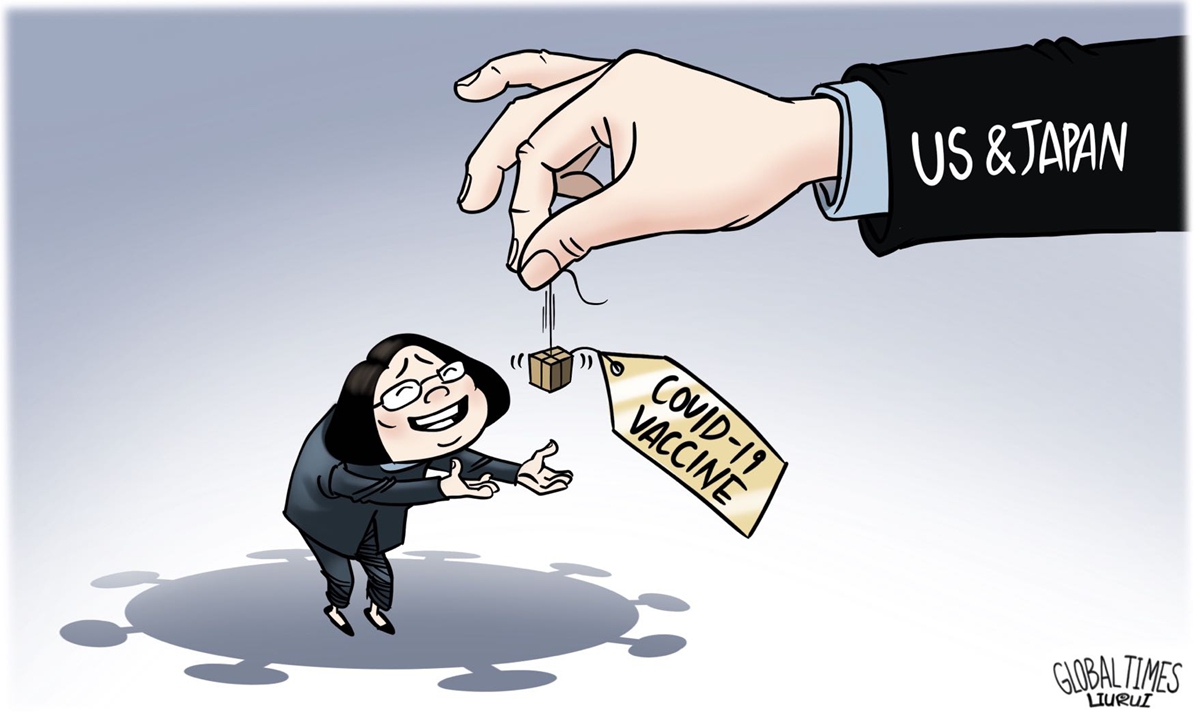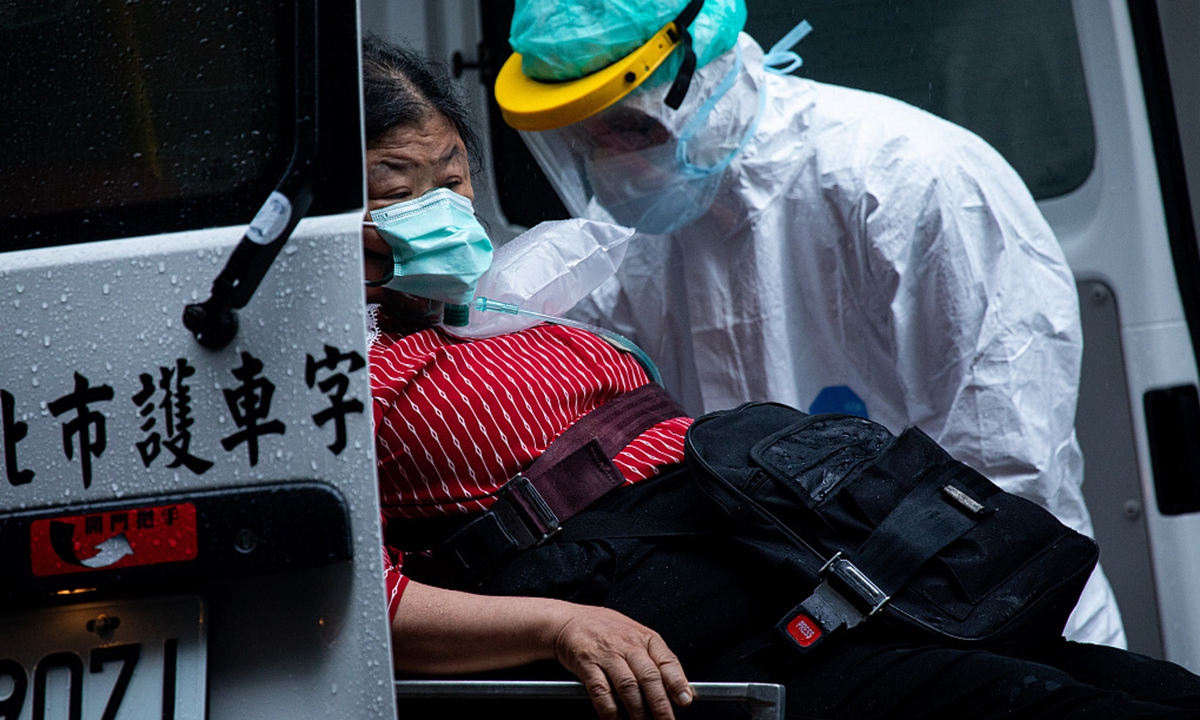US, Taiwan collude as DPP mired in epidemic fiasco
3 US senators make 3-hour stopover; vaccine aid covers military exchange

Illustration: Liu Rui/GT
Three US senators' so-called three-hour vaccine aid visit to the island of Taiwan is viewed by analysts to disguise increasing US-Taiwan military exchanges, as the three landed in a C-17 US military aircraft. They also view Taiwan's high-profile welcome of the US senators' visit as an intent by the Democratic Progressive Party (DPP) to flare the tension with the Chinese mainland and create more conflict, in order to divert attention from its failure to bring the ravaging COVID-19 infection under control.
Under the banner of humanitarianism, Senator Tammy Duckworth said at a press conference on Sunday that the US will donate 750,000 COVID-19 vaccine doses to the epidemic-hit island with over 23 million residents.
Taiwan secessionist authorities rushed to hail the "victory" brought by allies, while mainland experts see the military and political risks beneath the vaccine supply, describing the visit as the most serious provocation that the White House has made to the Chinese mainland over Taiwan question since US President Joe Biden took office, which takes salami-slicing tactic in developing an "official relationship" with the island and eroding the one-China policy.
Duckworth, accompanied by senators Christopher Coons and Dan Sullivan, landed at Taipei's Songshan Airport on Sunday morning, with their activities confined to the military area of the airport due to the "epidemic prevention request," according to Taiwan media. It highlights Duckworth and Sullivan's posts in the Senate Committee on Armed Services, and Coons, who serves in the Senate Foreign Relations Committee.
Amid the public anger in Taiwan and repeated rejection and vilification of mainland vaccines by the DPP, the island's regional leader Tsai Ing-wen touted the 750,000 doses of vaccine as "timely rain," and Taiwan will bear in mind that, even though there is no date for their delivery yet.
Just a day before the US politicians' Taiwan visit, the military authority of the island announced on Saturday that the island's troops will conduct live-fire tests of two tank guns it purchased from the US. On Friday, Taiwan's media hyped that mainland military plane entered the "air defense identification zone (ADIZ)" in Taiwan's southwest airspace at 4 am.
Experts reached by the Global Times said that the mainland should be vigilant about the trade behind the US vaccine donation, calling for slapping sanctions on US politicians who have been provocative on the Taiwan question, and adopting a sterner stance toward island of Taiwan in terms of the military response.
Dual provocations
The senators' visit to Taiwan is a deliberate, risky provocation and comes under the disguise of supplying vaccines, and the mainland will not sit idly by, Lü Xiang, a research fellow at the Chinese Academy of Social Sciences, told the Global Times on Sunday.
It is entirely possible for the US to solve the issue of vaccine donation to Taiwan through commercial companies. And there is no need for the presence of senators and military aircraft, Lü said, describing the visit as "the most serious provocation" since Biden took office.
According to military experts, the three senators are also providing a cover for a military exchange between the US and the island.
Song Zhongping, a Chinese military expert told the Global Times on Sunday that the C-17 is a strategic transport aircraft. In the United States Air Force, the C-17 is the second-largest strategic transport aircraft to the C-5 Galaxy.
The landing of the US Air Force strategic aircraft in Taiwan indicates that military cooperation and exchanges between the US and the island are increasing, Song said, noting the purpose of carrying three senators is to divert attention from the nature of military exchanges.
The C-17 was probably carrying a large amount of military supplies, either for the Taiwan's military or for the American Institute in Taiwan (AIT), said Song, pointing out that the three hours at the airport perfectly fit the time needed to unload cargo.
Aside from military provocations, the political one was equally obvious from the US. Experts say the senators' Taiwan stopover is an assault on the Three Joint Communiques between China and the US, which embody the one-China principle. And the US and the DPP may have the purpose of making the C-17 landing in Taiwan a fait accompli forced on the mainland, paving the way for upgrading their links in the future.
Yuan Zheng, deputy director of the Institute of American Studies at the Chinese Academy of Social Sciences, told the Global Times on Sunday that the Biden administration continues to test China's red line by gradually hollowing out its one-China policy and developing meaningful "diplomatic relations" with Taiwan island.
The Biden administration has recently waived sanctions on the company behind Russia's Nord Stream 2 gas pipeline to Germany, a move seen as a concession to Germany and Russia.
Some analysts said that the latest Taiwan card before Biden's Europe trip for the G7 meeting in the UK is aimed at showing US allies that the administration is not "weak."
It is expected that the mainland air force and navy would take actions as the US escalates the cross-Straits tensions, said Lü, noting the previous military patrols adjacent to the island southwest regions may move to northwest regions, a location closer to Taipei.
China should draw a clearer red line on the Taiwan question. Foreign politicians and officials who have crossed the line should not be allowed to enter China, and Chinese companies are not allowed to have any dealings with them, experts said.

Medical workers wearing protective suits seen transferring a covid-19 patient from a quarantine centre in Taipei, island of Taiwan, on May 30. Photo: VCG
DPP's derailment
Since the outbreak of the new COVID-19 surge on the island of Taiwan, the DPP authorities have been denounced for multiple anti-scientific measures, including refusing mass testing and snubbing vaccine assistance from the mainland, ignoring local cries and growing death toll.
Taiwan's anti-epidemic command center reported 343 domestic-transmitted cases, and 36 deaths on Sunday, local media reported.
Tsai, whose public support rate has dropped by nearly 20 percent compared to the time of her re-election victory in May 2020, is facing local mockery after her team released footable footage of Sunday's meeting, which shows Tsai was standing while speaking, and all three US senators were sitting and listening to a "work report."
Despite the US promise, Chiang Chi-chen, the leader of opposition party Kuomintang (KMT) on the island, said on Sunday that the island needs more vaccines to quench the thirst.
When the people on the island are suffering from vaccine shortages, the secession-minded DPP has declared they will donate 300,000 doses of AstraZeneca (AZ) vaccines to countries like Honduras and Paraguay, which still maintain "diplomatic ties" with the Taiwan authorities, and the DPP even bribed certain officials from the countries to realize the plan, an exclusive source told the Global Times on Friday.
The 1.24 million doses of AZ vaccine donated by Japan arrived in Taiwan on Friday. In addition to the 860,000 doses currently in the hands of the DPP authority, and the 750,000 doses promised by the US on Sunday but without a clear delivery date, the island's number of vaccines still does not reach even one-tenth of people that need to be vaccinated for herd immunity.
Wang Jianmin, a senior cross-Straits expert at Minnan Normal University, Fujian Province, told the Global Times on Sunday that the DPP authorities have been dealing with vaccine affairs under a pro-US and pro-Japan, but anti-mainland strategy. However, the US and Japan are not really trying to solve Taiwan's vaccine shortage, but are acting out of pure political manipulation.
The experts pointed out that the AZ vaccine is considered to be defective in safety. Although Japan is also suffering from the epidemic, Japan has not passed the AZ vaccines for emergency use so far.
"The empty promise of 750,000 doses is more of a symbolic reward after Taiwan has repeatedly rejected the mainland vaccine and has expressed its anti-mainland determination in various ways to the US," Wang said.
Two mainland vaccines have been listed by the WHO for the emergency use, and hundreds of millions of doses of vaccines have been delivered to more than 80 countries and regions.
"There is no political manipulation behind the mainland's kindness like the DPP hyped… DPP's repeated rejection of the mainland has caused Taiwan people to miss the best time to combat the virus through vaccines," Wang said, citing the increasing death toll on the island.
In terms of the military response, the Chinese mainland may adopt a more stern stance against the DPP authorities, so that Taiwan will not get any benefits in following the US to counter the mainland, and instead pay a higher price, Wang said.
Some experts said that the DPP authorities are aware that Sunday's event will raise the level of tensions between across the Taiwan straits, but they need to create more conflict with the mainland to shift attention from the frictions between the DPP authorities and Taiwan residents, painting the soaring death roll in the island as the "due price" for confronting the mainland.
Therefore, while the mainland needs to maintain deterrence against secessionist forces in the island, it should avoid its countermeasures being exploited by the DPP authorities to shift the blame, the expert said.


